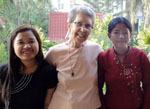Dembélé Salimata, Côte d’Ivoire

When two of Dembélé Salimata’s sisters died of AIDS- related causes, she decided to get involved in the HIV epidemic.
Born and raised in Côte d’Ivoire, Dembélé was trained as a social worker before studying theology.
“I now work with community and religious leaders who discriminate against people living with HIV because they lack the necessary information. CALLED TO CARE workbooks have been a tremendous help to me. For example, no. 1, Positive Voices – just seeing the photos of all those religious leaders living with HIV has a tremendous impact on people, even those who can’t read.”
Dembélé first read about STRATEGIES FOR HOPE materials through the Footsteps newsletter, published by Tearfund. She contacted the STRATEGIES FOR HOPE office in Oxford, and we began sending her multiple copies of the four CALLED TO CARE manuals published in French. She now has a number of roles in which she uses these materials.
“First, I am assistant pastor in a parish of the Christian and Missionary Alliance in Yamoussoukro. I also teach theology in our two training institutions: the Yamoussoukro Bible Institute and the Bible School of the Christian Alliance, where I teach communication and HIV/AIDS.

“In our Bible schools the HIV training programme is divided into two parts. The first part consists of general knowledge about HIV and AIDS. I use Positive Voices to introduce the course by citing the testimonies of the religious leaders in the book. We then move on to the second part, using Time to Talk, which deals with living as a family in the age of AIDS.
“The students work in small groups to study and talk, using the Biblical verses in these two workbooks. As the lessons are already prepared, it’s easy to get discussions going. At the end of the course the students tell us about how their attitudes have changed. We also encourage them to use information about HIV when they start working in churches. To help them plan and implement projects, we give them a copy of CALLED TO CARE manual no. 2, Making it Happen. We also use this manual with our NGO Femme, Lumière, Vie (Woman, Light, Life). The ideas about planning, budgeting and accountability are very useful for strengthening our management capacities.
“We then use CALLED TO CARE manual no. 7, Call to Me: How the Bible speaks in the age of AIDS, divided into groups of 3 to 5 students who work on one Bible study and then present it to the others in a plenary session, followed by a discussion. In this way each group of our students discovers a new “version” of the Biblical texts, which helps to enrich their learning experience and makes them more sensitive to the issues associated with HIV.
“Former students have told us that they have used parts of the CALLED TO CARE workbooks with young people and with couples. We encourage them to maintain a small library which parents and young people can use to inform themselves about various subjects, including HIV and health in general.”
Dembélé is also a CALLED TO CARE Ambassador, promoting the widespread use of the workbooks in Côte d’Ivoire and advocating for their production in African languages:
“I have put copies of the CALLED TO CARE manuals in secondary schools, youth centres, hospital waiting rooms and the offices of NGOs involved in HIV/AIDS-related work. We would like to have these manuals translated into the Baoulé and Malinke/Dioula languages, but we need to find money to encourage the translators.”




